Analysing Organisational Behaviour at TESCO: Culture, Politics, Power
VerifiedAdded on 2023/01/12
|12
|3081
|63
Report
AI Summary
This report provides an in-depth analysis of organisational behaviour within TESCO, a major UK supermarket chain. It examines the influence of culture, politics, and power on individual and team performance, highlighting how these factors impact productivity and employee satisfaction. The report explores different types of organisational culture, including power, task, person, and role cultures, and how these influence employee behaviour. It also investigates the impact of organisational politics and power dynamics on employee motivation and productivity. Furthermore, the report delves into motivational theories such as Maslow's Hierarchy of Needs and Adam's Equity Theory, explaining how TESCO applies these concepts to achieve its goals and objectives. The report also differentiates between effective and ineffective teams, using the Tuckman model to illustrate team development stages. The report concludes by presenting philosophies and concepts of organisational behaviour relevant to TESCO, offering valuable insights into creating a positive and productive work environment.
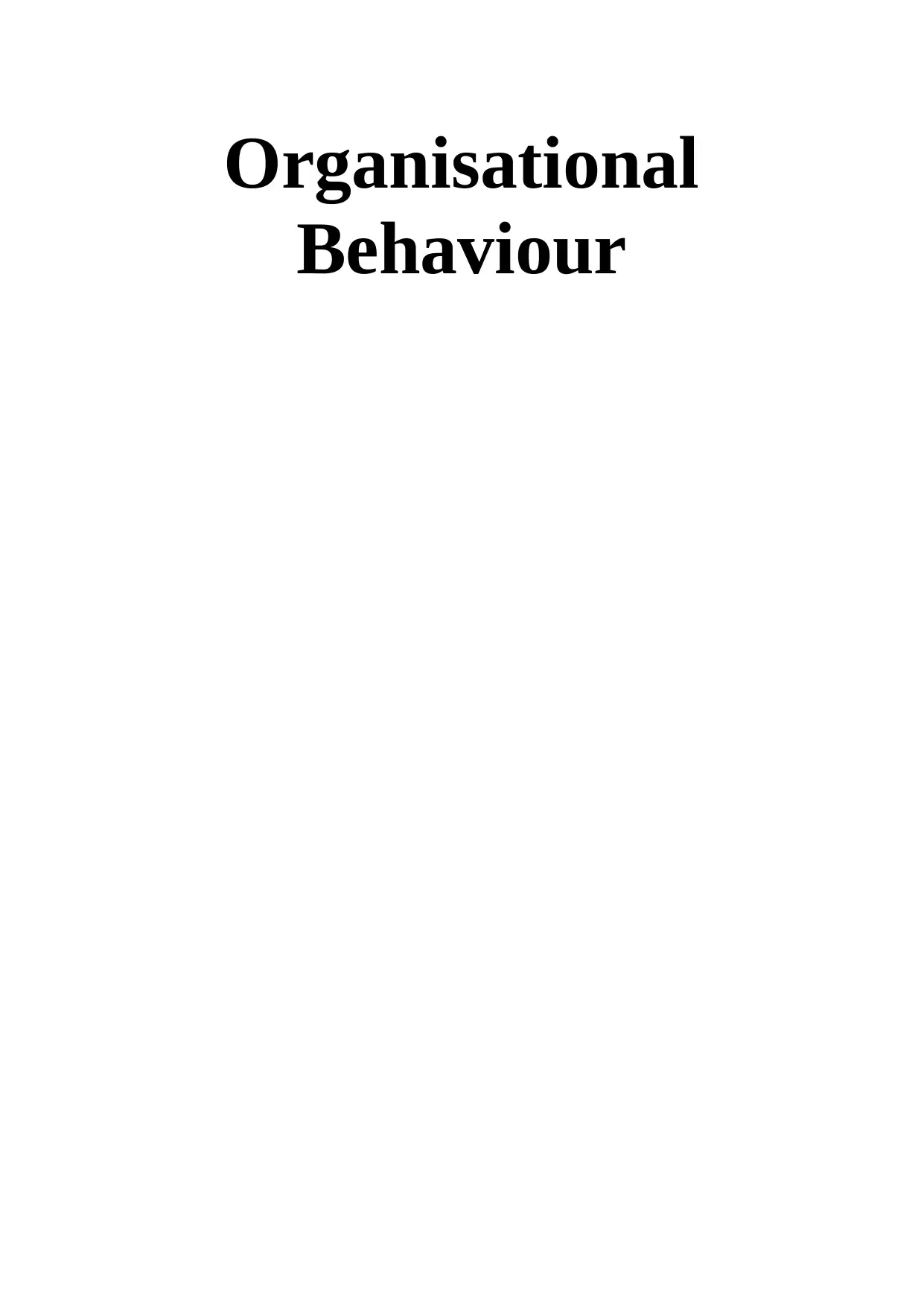
Organisational
Behaviour
Behaviour
Paraphrase This Document
Need a fresh take? Get an instant paraphrase of this document with our AI Paraphraser
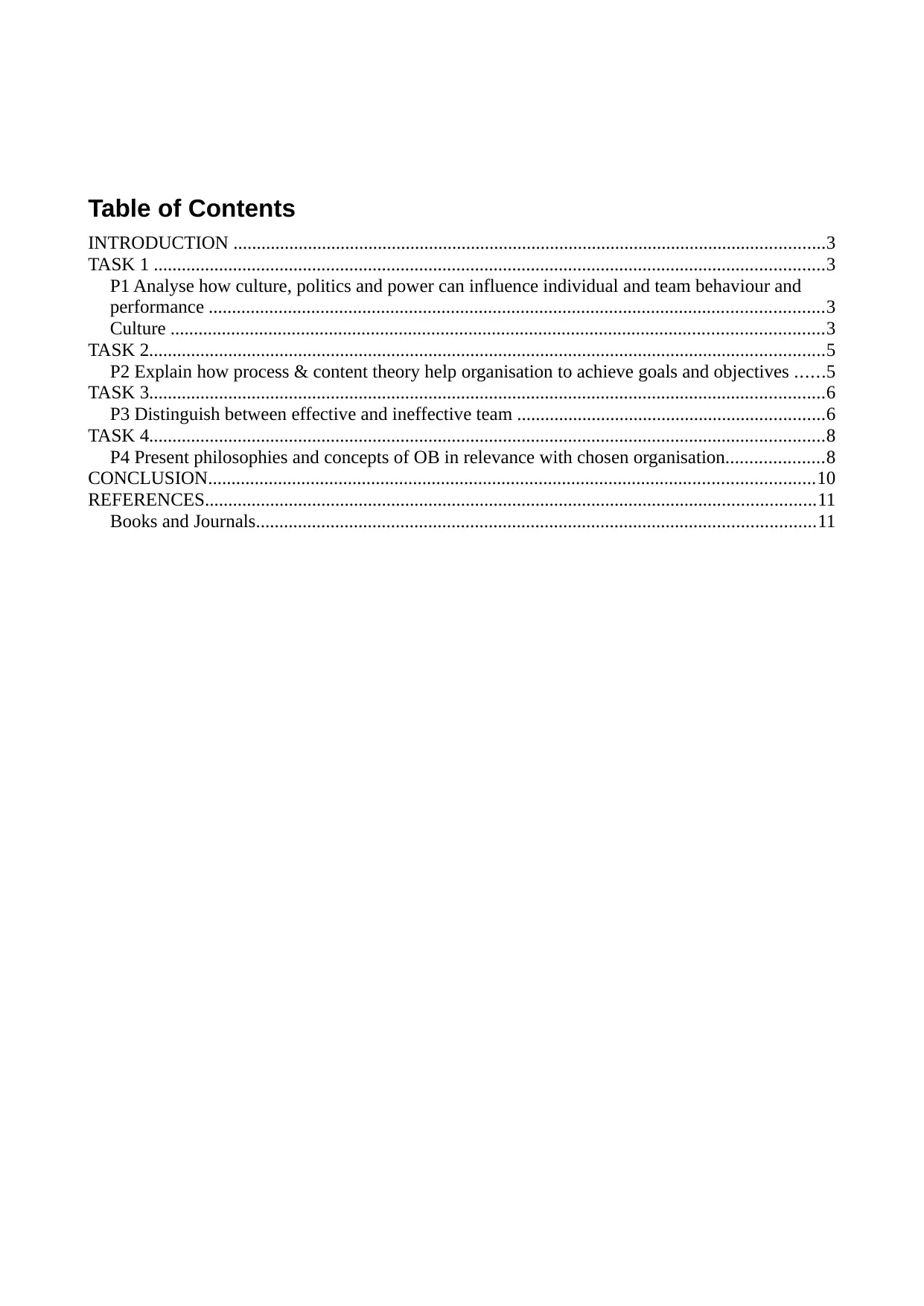
Table of Contents
INTRODUCTION ...............................................................................................................................3
TASK 1 ................................................................................................................................................3
P1 Analyse how culture, politics and power can influence individual and team behaviour and
performance ....................................................................................................................................3
Culture ............................................................................................................................................3
TASK 2.................................................................................................................................................5
P2 Explain how process & content theory help organisation to achieve goals and objectives ......5
TASK 3.................................................................................................................................................6
P3 Distinguish between effective and ineffective team ..................................................................6
TASK 4.................................................................................................................................................8
P4 Present philosophies and concepts of OB in relevance with chosen organisation.....................8
CONCLUSION..................................................................................................................................10
REFERENCES...................................................................................................................................11
Books and Journals........................................................................................................................11
INTRODUCTION ...............................................................................................................................3
TASK 1 ................................................................................................................................................3
P1 Analyse how culture, politics and power can influence individual and team behaviour and
performance ....................................................................................................................................3
Culture ............................................................................................................................................3
TASK 2.................................................................................................................................................5
P2 Explain how process & content theory help organisation to achieve goals and objectives ......5
TASK 3.................................................................................................................................................6
P3 Distinguish between effective and ineffective team ..................................................................6
TASK 4.................................................................................................................................................8
P4 Present philosophies and concepts of OB in relevance with chosen organisation.....................8
CONCLUSION..................................................................................................................................10
REFERENCES...................................................................................................................................11
Books and Journals........................................................................................................................11
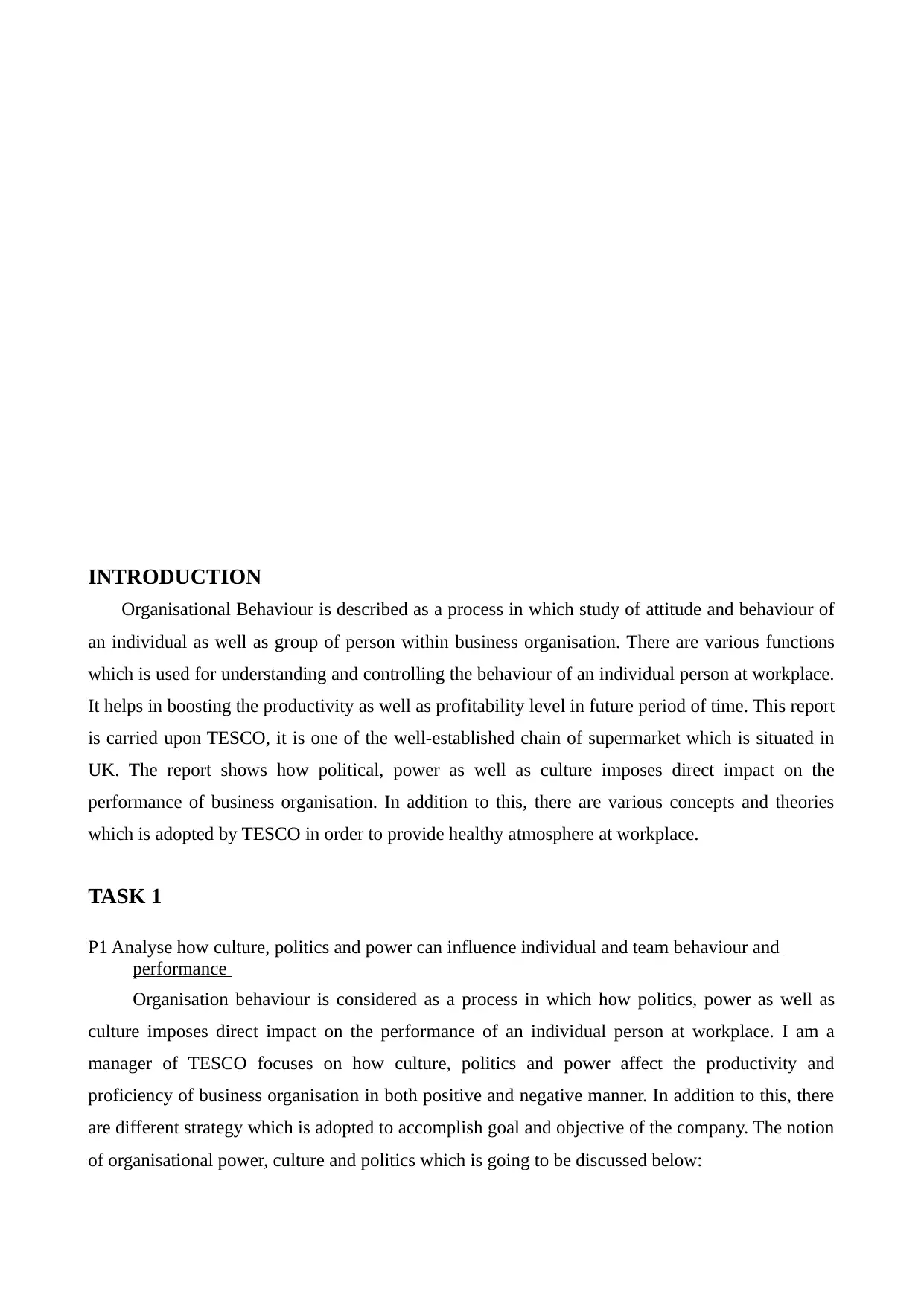
INTRODUCTION
Organisational Behaviour is described as a process in which study of attitude and behaviour of
an individual as well as group of person within business organisation. There are various functions
which is used for understanding and controlling the behaviour of an individual person at workplace.
It helps in boosting the productivity as well as profitability level in future period of time. This report
is carried upon TESCO, it is one of the well-established chain of supermarket which is situated in
UK. The report shows how political, power as well as culture imposes direct impact on the
performance of business organisation. In addition to this, there are various concepts and theories
which is adopted by TESCO in order to provide healthy atmosphere at workplace.
TASK 1
P1 Analyse how culture, politics and power can influence individual and team behaviour and
performance
Organisation behaviour is considered as a process in which how politics, power as well as
culture imposes direct impact on the performance of an individual person at workplace. I am a
manager of TESCO focuses on how culture, politics and power affect the productivity and
proficiency of business organisation in both positive and negative manner. In addition to this, there
are different strategy which is adopted to accomplish goal and objective of the company. The notion
of organisational power, culture and politics which is going to be discussed below:
Organisational Behaviour is described as a process in which study of attitude and behaviour of
an individual as well as group of person within business organisation. There are various functions
which is used for understanding and controlling the behaviour of an individual person at workplace.
It helps in boosting the productivity as well as profitability level in future period of time. This report
is carried upon TESCO, it is one of the well-established chain of supermarket which is situated in
UK. The report shows how political, power as well as culture imposes direct impact on the
performance of business organisation. In addition to this, there are various concepts and theories
which is adopted by TESCO in order to provide healthy atmosphere at workplace.
TASK 1
P1 Analyse how culture, politics and power can influence individual and team behaviour and
performance
Organisation behaviour is considered as a process in which how politics, power as well as
culture imposes direct impact on the performance of an individual person at workplace. I am a
manager of TESCO focuses on how culture, politics and power affect the productivity and
proficiency of business organisation in both positive and negative manner. In addition to this, there
are different strategy which is adopted to accomplish goal and objective of the company. The notion
of organisational power, culture and politics which is going to be discussed below:
⊘ This is a preview!⊘
Do you want full access?
Subscribe today to unlock all pages.

Trusted by 1+ million students worldwide
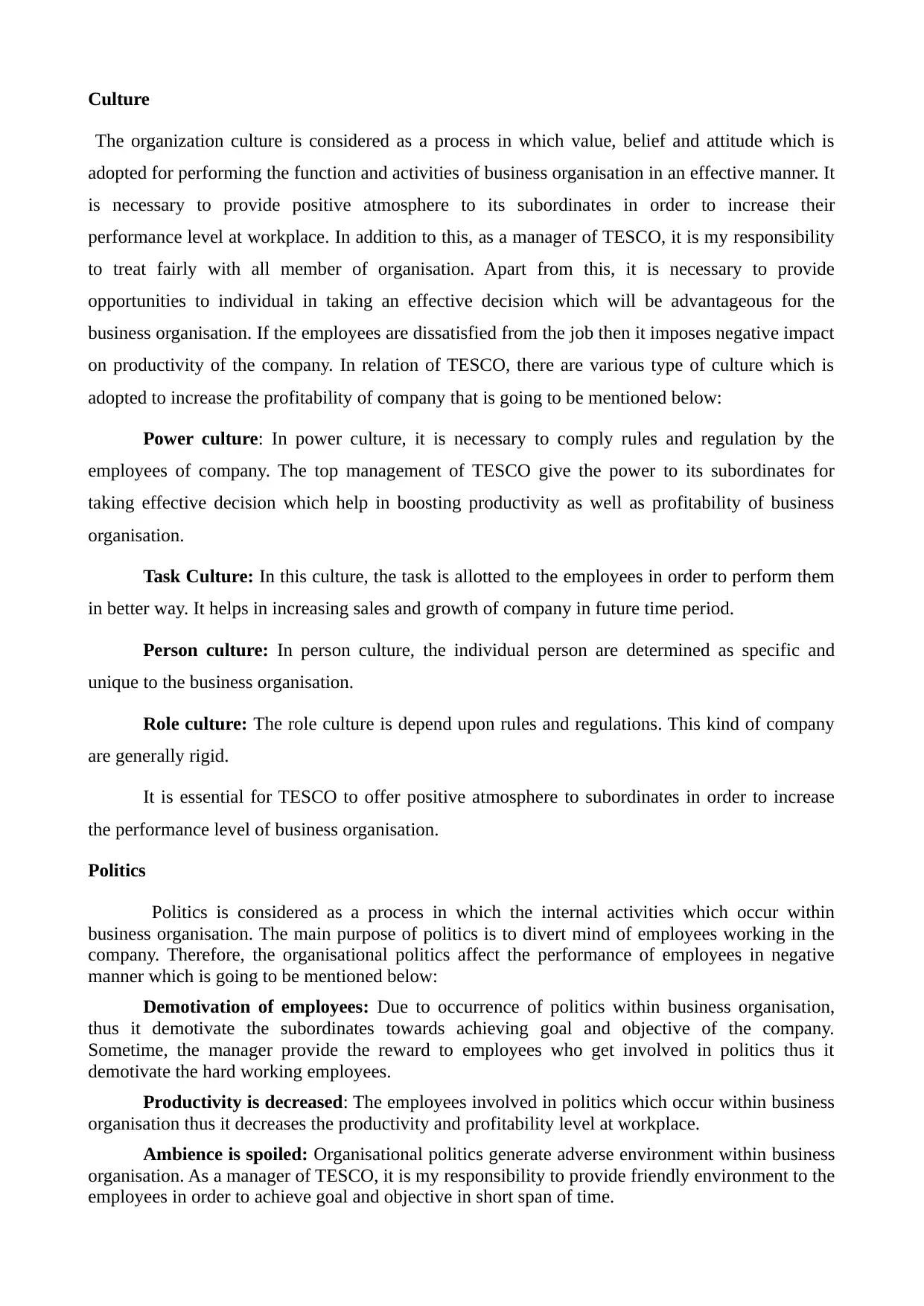
Culture
The organization culture is considered as a process in which value, belief and attitude which is
adopted for performing the function and activities of business organisation in an effective manner. It
is necessary to provide positive atmosphere to its subordinates in order to increase their
performance level at workplace. In addition to this, as a manager of TESCO, it is my responsibility
to treat fairly with all member of organisation. Apart from this, it is necessary to provide
opportunities to individual in taking an effective decision which will be advantageous for the
business organisation. If the employees are dissatisfied from the job then it imposes negative impact
on productivity of the company. In relation of TESCO, there are various type of culture which is
adopted to increase the profitability of company that is going to be mentioned below:
Power culture: In power culture, it is necessary to comply rules and regulation by the
employees of company. The top management of TESCO give the power to its subordinates for
taking effective decision which help in boosting productivity as well as profitability of business
organisation.
Task Culture: In this culture, the task is allotted to the employees in order to perform them
in better way. It helps in increasing sales and growth of company in future time period.
Person culture: In person culture, the individual person are determined as specific and
unique to the business organisation.
Role culture: The role culture is depend upon rules and regulations. This kind of company
are generally rigid.
It is essential for TESCO to offer positive atmosphere to subordinates in order to increase
the performance level of business organisation.
Politics
Politics is considered as a process in which the internal activities which occur within
business organisation. The main purpose of politics is to divert mind of employees working in the
company. Therefore, the organisational politics affect the performance of employees in negative
manner which is going to be mentioned below:
Demotivation of employees: Due to occurrence of politics within business organisation,
thus it demotivate the subordinates towards achieving goal and objective of the company.
Sometime, the manager provide the reward to employees who get involved in politics thus it
demotivate the hard working employees.
Productivity is decreased: The employees involved in politics which occur within business
organisation thus it decreases the productivity and profitability level at workplace.
Ambience is spoiled: Organisational politics generate adverse environment within business
organisation. As a manager of TESCO, it is my responsibility to provide friendly environment to the
employees in order to achieve goal and objective in short span of time.
The organization culture is considered as a process in which value, belief and attitude which is
adopted for performing the function and activities of business organisation in an effective manner. It
is necessary to provide positive atmosphere to its subordinates in order to increase their
performance level at workplace. In addition to this, as a manager of TESCO, it is my responsibility
to treat fairly with all member of organisation. Apart from this, it is necessary to provide
opportunities to individual in taking an effective decision which will be advantageous for the
business organisation. If the employees are dissatisfied from the job then it imposes negative impact
on productivity of the company. In relation of TESCO, there are various type of culture which is
adopted to increase the profitability of company that is going to be mentioned below:
Power culture: In power culture, it is necessary to comply rules and regulation by the
employees of company. The top management of TESCO give the power to its subordinates for
taking effective decision which help in boosting productivity as well as profitability of business
organisation.
Task Culture: In this culture, the task is allotted to the employees in order to perform them
in better way. It helps in increasing sales and growth of company in future time period.
Person culture: In person culture, the individual person are determined as specific and
unique to the business organisation.
Role culture: The role culture is depend upon rules and regulations. This kind of company
are generally rigid.
It is essential for TESCO to offer positive atmosphere to subordinates in order to increase
the performance level of business organisation.
Politics
Politics is considered as a process in which the internal activities which occur within
business organisation. The main purpose of politics is to divert mind of employees working in the
company. Therefore, the organisational politics affect the performance of employees in negative
manner which is going to be mentioned below:
Demotivation of employees: Due to occurrence of politics within business organisation,
thus it demotivate the subordinates towards achieving goal and objective of the company.
Sometime, the manager provide the reward to employees who get involved in politics thus it
demotivate the hard working employees.
Productivity is decreased: The employees involved in politics which occur within business
organisation thus it decreases the productivity and profitability level at workplace.
Ambience is spoiled: Organisational politics generate adverse environment within business
organisation. As a manager of TESCO, it is my responsibility to provide friendly environment to the
employees in order to achieve goal and objective in short span of time.
Paraphrase This Document
Need a fresh take? Get an instant paraphrase of this document with our AI Paraphraser
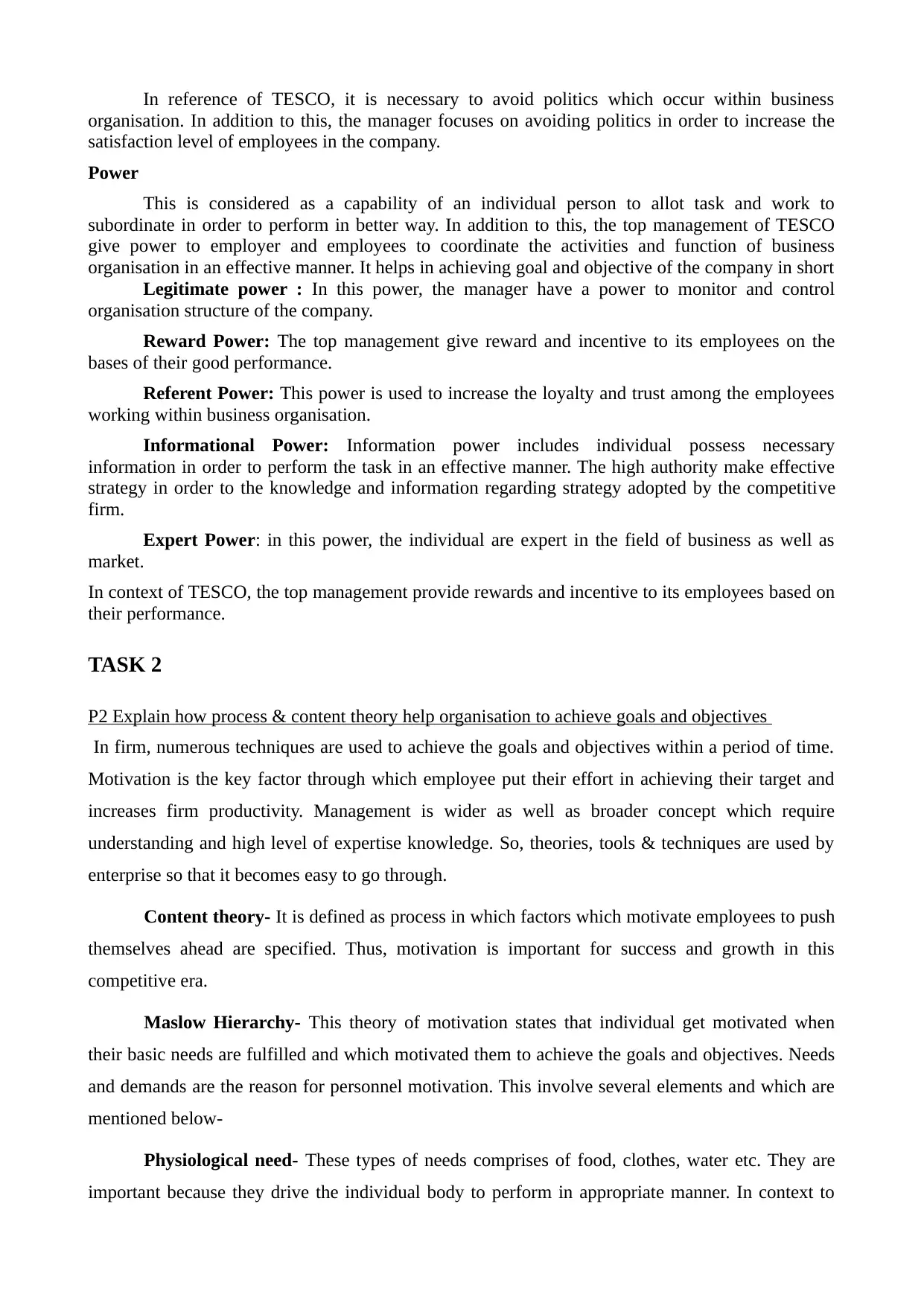
In reference of TESCO, it is necessary to avoid politics which occur within business
organisation. In addition to this, the manager focuses on avoiding politics in order to increase the
satisfaction level of employees in the company.
Power
This is considered as a capability of an individual person to allot task and work to
subordinate in order to perform in better way. In addition to this, the top management of TESCO
give power to employer and employees to coordinate the activities and function of business
organisation in an effective manner. It helps in achieving goal and objective of the company in short
Legitimate power : In this power, the manager have a power to monitor and control
organisation structure of the company.
Reward Power: The top management give reward and incentive to its employees on the
bases of their good performance.
Referent Power: This power is used to increase the loyalty and trust among the employees
working within business organisation.
Informational Power: Information power includes individual possess necessary
information in order to perform the task in an effective manner. The high authority make effective
strategy in order to the knowledge and information regarding strategy adopted by the competitive
firm.
Expert Power: in this power, the individual are expert in the field of business as well as
market.
In context of TESCO, the top management provide rewards and incentive to its employees based on
their performance.
TASK 2
P2 Explain how process & content theory help organisation to achieve goals and objectives
In firm, numerous techniques are used to achieve the goals and objectives within a period of time.
Motivation is the key factor through which employee put their effort in achieving their target and
increases firm productivity. Management is wider as well as broader concept which require
understanding and high level of expertise knowledge. So, theories, tools & techniques are used by
enterprise so that it becomes easy to go through.
Content theory- It is defined as process in which factors which motivate employees to push
themselves ahead are specified. Thus, motivation is important for success and growth in this
competitive era.
Maslow Hierarchy- This theory of motivation states that individual get motivated when
their basic needs are fulfilled and which motivated them to achieve the goals and objectives. Needs
and demands are the reason for personnel motivation. This involve several elements and which are
mentioned below-
Physiological need- These types of needs comprises of food, clothes, water etc. They are
important because they drive the individual body to perform in appropriate manner. In context to
organisation. In addition to this, the manager focuses on avoiding politics in order to increase the
satisfaction level of employees in the company.
Power
This is considered as a capability of an individual person to allot task and work to
subordinate in order to perform in better way. In addition to this, the top management of TESCO
give power to employer and employees to coordinate the activities and function of business
organisation in an effective manner. It helps in achieving goal and objective of the company in short
Legitimate power : In this power, the manager have a power to monitor and control
organisation structure of the company.
Reward Power: The top management give reward and incentive to its employees on the
bases of their good performance.
Referent Power: This power is used to increase the loyalty and trust among the employees
working within business organisation.
Informational Power: Information power includes individual possess necessary
information in order to perform the task in an effective manner. The high authority make effective
strategy in order to the knowledge and information regarding strategy adopted by the competitive
firm.
Expert Power: in this power, the individual are expert in the field of business as well as
market.
In context of TESCO, the top management provide rewards and incentive to its employees based on
their performance.
TASK 2
P2 Explain how process & content theory help organisation to achieve goals and objectives
In firm, numerous techniques are used to achieve the goals and objectives within a period of time.
Motivation is the key factor through which employee put their effort in achieving their target and
increases firm productivity. Management is wider as well as broader concept which require
understanding and high level of expertise knowledge. So, theories, tools & techniques are used by
enterprise so that it becomes easy to go through.
Content theory- It is defined as process in which factors which motivate employees to push
themselves ahead are specified. Thus, motivation is important for success and growth in this
competitive era.
Maslow Hierarchy- This theory of motivation states that individual get motivated when
their basic needs are fulfilled and which motivated them to achieve the goals and objectives. Needs
and demands are the reason for personnel motivation. This involve several elements and which are
mentioned below-
Physiological need- These types of needs comprises of food, clothes, water etc. They are
important because they drive the individual body to perform in appropriate manner. In context to
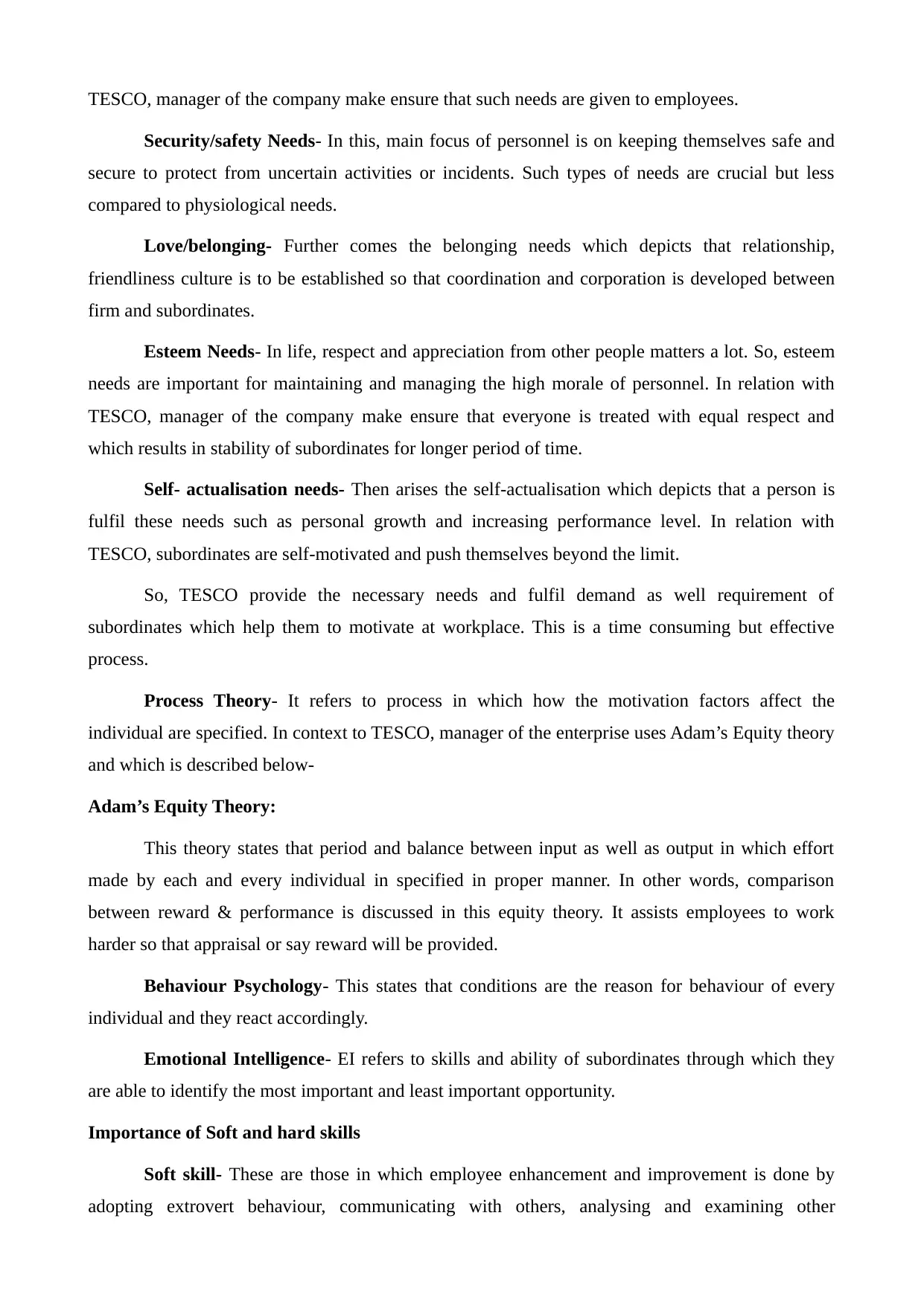
TESCO, manager of the company make ensure that such needs are given to employees.
Security/safety Needs- In this, main focus of personnel is on keeping themselves safe and
secure to protect from uncertain activities or incidents. Such types of needs are crucial but less
compared to physiological needs.
Love/belonging- Further comes the belonging needs which depicts that relationship,
friendliness culture is to be established so that coordination and corporation is developed between
firm and subordinates.
Esteem Needs- In life, respect and appreciation from other people matters a lot. So, esteem
needs are important for maintaining and managing the high morale of personnel. In relation with
TESCO, manager of the company make ensure that everyone is treated with equal respect and
which results in stability of subordinates for longer period of time.
Self- actualisation needs- Then arises the self-actualisation which depicts that a person is
fulfil these needs such as personal growth and increasing performance level. In relation with
TESCO, subordinates are self-motivated and push themselves beyond the limit.
So, TESCO provide the necessary needs and fulfil demand as well requirement of
subordinates which help them to motivate at workplace. This is a time consuming but effective
process.
Process Theory- It refers to process in which how the motivation factors affect the
individual are specified. In context to TESCO, manager of the enterprise uses Adam’s Equity theory
and which is described below-
Adam’s Equity Theory:
This theory states that period and balance between input as well as output in which effort
made by each and every individual in specified in proper manner. In other words, comparison
between reward & performance is discussed in this equity theory. It assists employees to work
harder so that appraisal or say reward will be provided.
Behaviour Psychology- This states that conditions are the reason for behaviour of every
individual and they react accordingly.
Emotional Intelligence- EI refers to skills and ability of subordinates through which they
are able to identify the most important and least important opportunity.
Importance of Soft and hard skills
Soft skill- These are those in which employee enhancement and improvement is done by
adopting extrovert behaviour, communicating with others, analysing and examining other
Security/safety Needs- In this, main focus of personnel is on keeping themselves safe and
secure to protect from uncertain activities or incidents. Such types of needs are crucial but less
compared to physiological needs.
Love/belonging- Further comes the belonging needs which depicts that relationship,
friendliness culture is to be established so that coordination and corporation is developed between
firm and subordinates.
Esteem Needs- In life, respect and appreciation from other people matters a lot. So, esteem
needs are important for maintaining and managing the high morale of personnel. In relation with
TESCO, manager of the company make ensure that everyone is treated with equal respect and
which results in stability of subordinates for longer period of time.
Self- actualisation needs- Then arises the self-actualisation which depicts that a person is
fulfil these needs such as personal growth and increasing performance level. In relation with
TESCO, subordinates are self-motivated and push themselves beyond the limit.
So, TESCO provide the necessary needs and fulfil demand as well requirement of
subordinates which help them to motivate at workplace. This is a time consuming but effective
process.
Process Theory- It refers to process in which how the motivation factors affect the
individual are specified. In context to TESCO, manager of the enterprise uses Adam’s Equity theory
and which is described below-
Adam’s Equity Theory:
This theory states that period and balance between input as well as output in which effort
made by each and every individual in specified in proper manner. In other words, comparison
between reward & performance is discussed in this equity theory. It assists employees to work
harder so that appraisal or say reward will be provided.
Behaviour Psychology- This states that conditions are the reason for behaviour of every
individual and they react accordingly.
Emotional Intelligence- EI refers to skills and ability of subordinates through which they
are able to identify the most important and least important opportunity.
Importance of Soft and hard skills
Soft skill- These are those in which employee enhancement and improvement is done by
adopting extrovert behaviour, communicating with others, analysing and examining other
⊘ This is a preview!⊘
Do you want full access?
Subscribe today to unlock all pages.

Trusted by 1+ million students worldwide
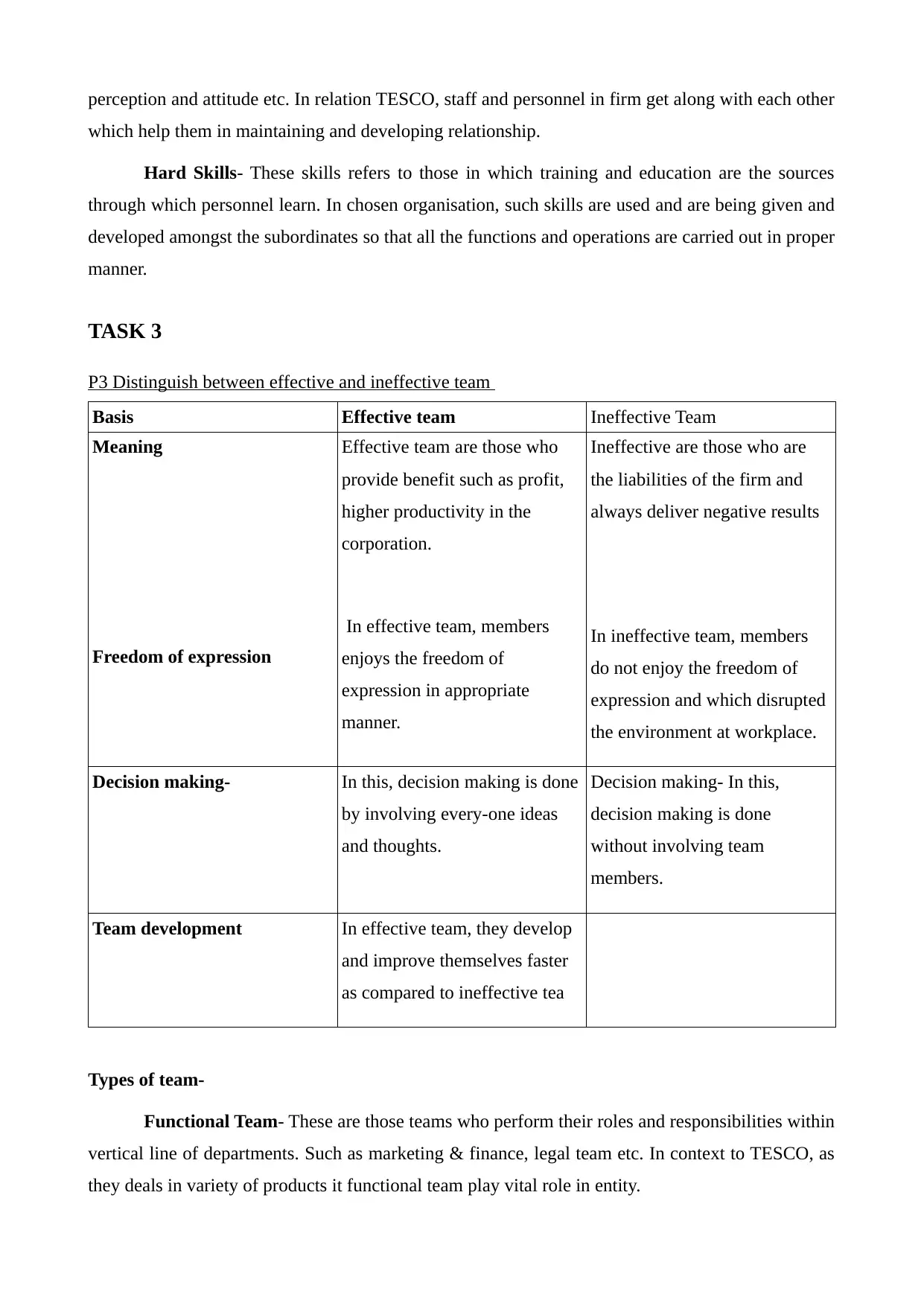
perception and attitude etc. In relation TESCO, staff and personnel in firm get along with each other
which help them in maintaining and developing relationship.
Hard Skills- These skills refers to those in which training and education are the sources
through which personnel learn. In chosen organisation, such skills are used and are being given and
developed amongst the subordinates so that all the functions and operations are carried out in proper
manner.
TASK 3
P3 Distinguish between effective and ineffective team
Basis Effective team Ineffective Team
Meaning
Freedom of expression
Effective team are those who
provide benefit such as profit,
higher productivity in the
corporation.
In effective team, members
enjoys the freedom of
expression in appropriate
manner.
Ineffective are those who are
the liabilities of the firm and
always deliver negative results
In ineffective team, members
do not enjoy the freedom of
expression and which disrupted
the environment at workplace.
Decision making- In this, decision making is done
by involving every-one ideas
and thoughts.
Decision making- In this,
decision making is done
without involving team
members.
Team development In effective team, they develop
and improve themselves faster
as compared to ineffective tea
Types of team-
Functional Team- These are those teams who perform their roles and responsibilities within
vertical line of departments. Such as marketing & finance, legal team etc. In context to TESCO, as
they deals in variety of products it functional team play vital role in entity.
which help them in maintaining and developing relationship.
Hard Skills- These skills refers to those in which training and education are the sources
through which personnel learn. In chosen organisation, such skills are used and are being given and
developed amongst the subordinates so that all the functions and operations are carried out in proper
manner.
TASK 3
P3 Distinguish between effective and ineffective team
Basis Effective team Ineffective Team
Meaning
Freedom of expression
Effective team are those who
provide benefit such as profit,
higher productivity in the
corporation.
In effective team, members
enjoys the freedom of
expression in appropriate
manner.
Ineffective are those who are
the liabilities of the firm and
always deliver negative results
In ineffective team, members
do not enjoy the freedom of
expression and which disrupted
the environment at workplace.
Decision making- In this, decision making is done
by involving every-one ideas
and thoughts.
Decision making- In this,
decision making is done
without involving team
members.
Team development In effective team, they develop
and improve themselves faster
as compared to ineffective tea
Types of team-
Functional Team- These are those teams who perform their roles and responsibilities within
vertical line of departments. Such as marketing & finance, legal team etc. In context to TESCO, as
they deals in variety of products it functional team play vital role in entity.
Paraphrase This Document
Need a fresh take? Get an instant paraphrase of this document with our AI Paraphraser
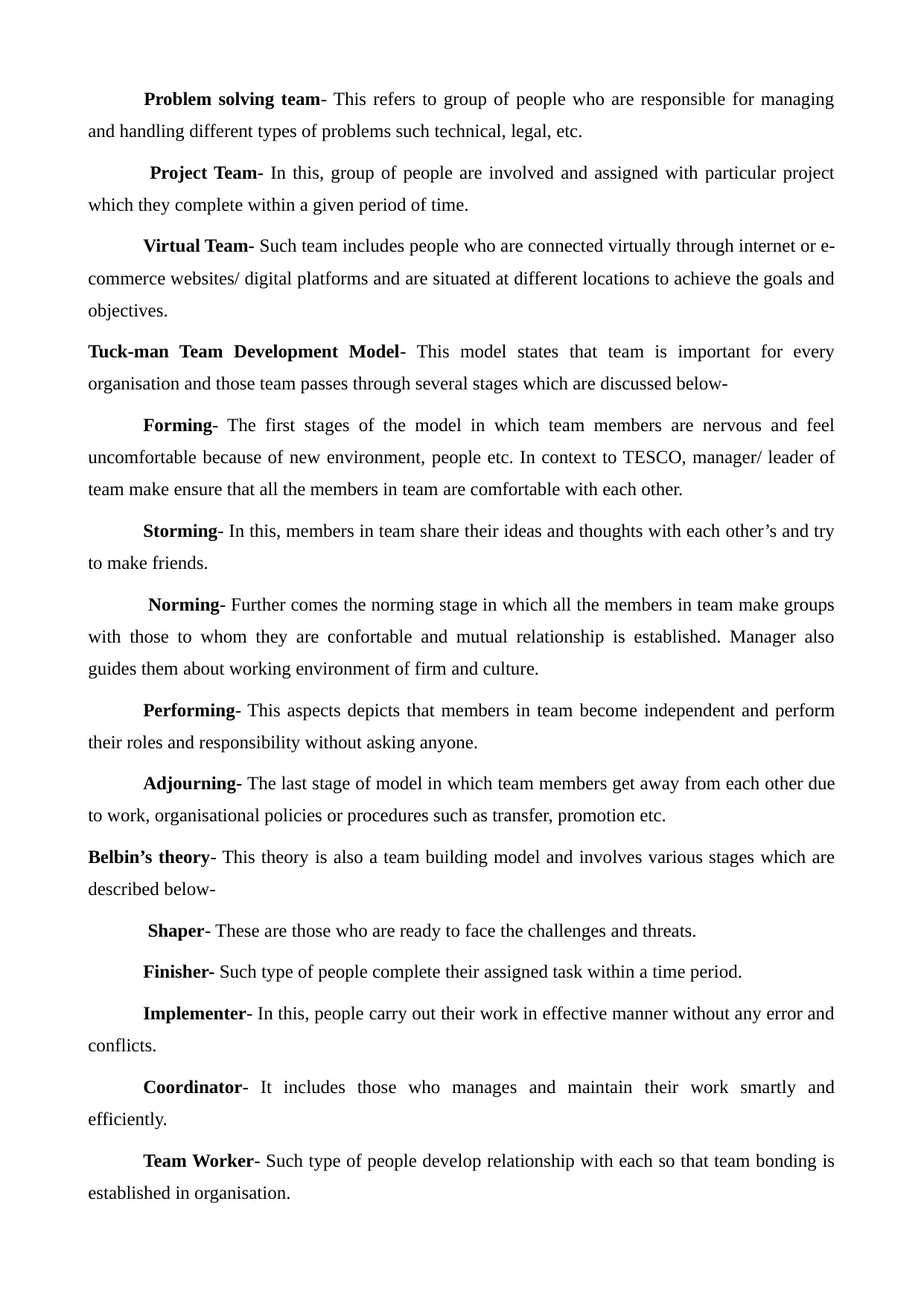
Problem solving team- This refers to group of people who are responsible for managing
and handling different types of problems such technical, legal, etc.
Project Team- In this, group of people are involved and assigned with particular project
which they complete within a given period of time.
Virtual Team- Such team includes people who are connected virtually through internet or e-
commerce websites/ digital platforms and are situated at different locations to achieve the goals and
objectives.
Tuck-man Team Development Model- This model states that team is important for every
organisation and those team passes through several stages which are discussed below-
Forming- The first stages of the model in which team members are nervous and feel
uncomfortable because of new environment, people etc. In context to TESCO, manager/ leader of
team make ensure that all the members in team are comfortable with each other.
Storming- In this, members in team share their ideas and thoughts with each other’s and try
to make friends.
Norming- Further comes the norming stage in which all the members in team make groups
with those to whom they are confortable and mutual relationship is established. Manager also
guides them about working environment of firm and culture.
Performing- This aspects depicts that members in team become independent and perform
their roles and responsibility without asking anyone.
Adjourning- The last stage of model in which team members get away from each other due
to work, organisational policies or procedures such as transfer, promotion etc.
Belbin’s theory- This theory is also a team building model and involves various stages which are
described below-
Shaper- These are those who are ready to face the challenges and threats.
Finisher- Such type of people complete their assigned task within a time period.
Implementer- In this, people carry out their work in effective manner without any error and
conflicts.
Coordinator- It includes those who manages and maintain their work smartly and
efficiently.
Team Worker- Such type of people develop relationship with each so that team bonding is
established in organisation.
and handling different types of problems such technical, legal, etc.
Project Team- In this, group of people are involved and assigned with particular project
which they complete within a given period of time.
Virtual Team- Such team includes people who are connected virtually through internet or e-
commerce websites/ digital platforms and are situated at different locations to achieve the goals and
objectives.
Tuck-man Team Development Model- This model states that team is important for every
organisation and those team passes through several stages which are discussed below-
Forming- The first stages of the model in which team members are nervous and feel
uncomfortable because of new environment, people etc. In context to TESCO, manager/ leader of
team make ensure that all the members in team are comfortable with each other.
Storming- In this, members in team share their ideas and thoughts with each other’s and try
to make friends.
Norming- Further comes the norming stage in which all the members in team make groups
with those to whom they are confortable and mutual relationship is established. Manager also
guides them about working environment of firm and culture.
Performing- This aspects depicts that members in team become independent and perform
their roles and responsibility without asking anyone.
Adjourning- The last stage of model in which team members get away from each other due
to work, organisational policies or procedures such as transfer, promotion etc.
Belbin’s theory- This theory is also a team building model and involves various stages which are
described below-
Shaper- These are those who are ready to face the challenges and threats.
Finisher- Such type of people complete their assigned task within a time period.
Implementer- In this, people carry out their work in effective manner without any error and
conflicts.
Coordinator- It includes those who manages and maintain their work smartly and
efficiently.
Team Worker- Such type of people develop relationship with each so that team bonding is
established in organisation.
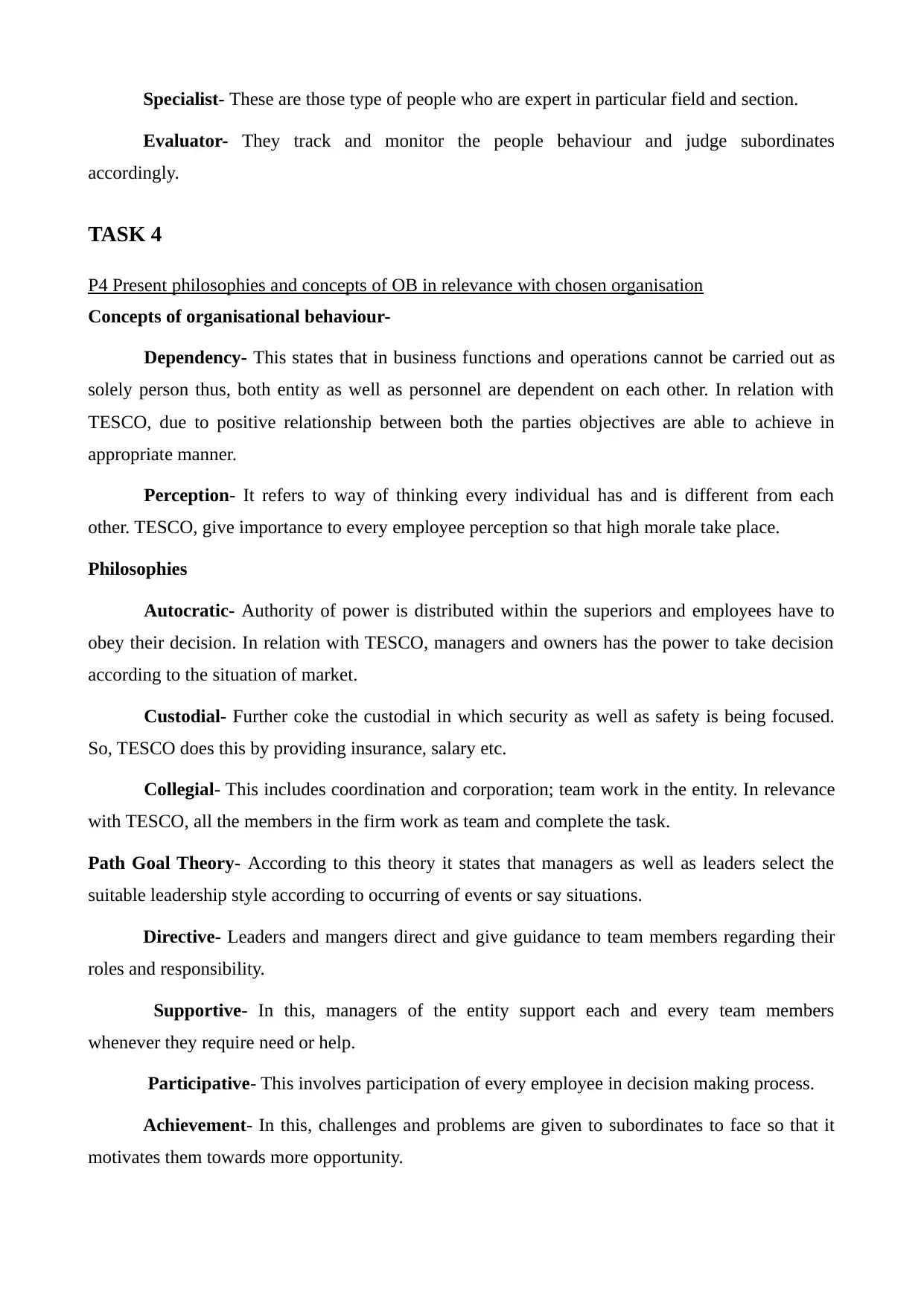
Specialist- These are those type of people who are expert in particular field and section.
Evaluator- They track and monitor the people behaviour and judge subordinates
accordingly.
TASK 4
P4 Present philosophies and concepts of OB in relevance with chosen organisation
Concepts of organisational behaviour-
Dependency- This states that in business functions and operations cannot be carried out as
solely person thus, both entity as well as personnel are dependent on each other. In relation with
TESCO, due to positive relationship between both the parties objectives are able to achieve in
appropriate manner.
Perception- It refers to way of thinking every individual has and is different from each
other. TESCO, give importance to every employee perception so that high morale take place.
Philosophies
Autocratic- Authority of power is distributed within the superiors and employees have to
obey their decision. In relation with TESCO, managers and owners has the power to take decision
according to the situation of market.
Custodial- Further coke the custodial in which security as well as safety is being focused.
So, TESCO does this by providing insurance, salary etc.
Collegial- This includes coordination and corporation; team work in the entity. In relevance
with TESCO, all the members in the firm work as team and complete the task.
Path Goal Theory- According to this theory it states that managers as well as leaders select the
suitable leadership style according to occurring of events or say situations.
Directive- Leaders and mangers direct and give guidance to team members regarding their
roles and responsibility.
Supportive- In this, managers of the entity support each and every team members
whenever they require need or help.
Participative- This involves participation of every employee in decision making process.
Achievement- In this, challenges and problems are given to subordinates to face so that it
motivates them towards more opportunity.
Evaluator- They track and monitor the people behaviour and judge subordinates
accordingly.
TASK 4
P4 Present philosophies and concepts of OB in relevance with chosen organisation
Concepts of organisational behaviour-
Dependency- This states that in business functions and operations cannot be carried out as
solely person thus, both entity as well as personnel are dependent on each other. In relation with
TESCO, due to positive relationship between both the parties objectives are able to achieve in
appropriate manner.
Perception- It refers to way of thinking every individual has and is different from each
other. TESCO, give importance to every employee perception so that high morale take place.
Philosophies
Autocratic- Authority of power is distributed within the superiors and employees have to
obey their decision. In relation with TESCO, managers and owners has the power to take decision
according to the situation of market.
Custodial- Further coke the custodial in which security as well as safety is being focused.
So, TESCO does this by providing insurance, salary etc.
Collegial- This includes coordination and corporation; team work in the entity. In relevance
with TESCO, all the members in the firm work as team and complete the task.
Path Goal Theory- According to this theory it states that managers as well as leaders select the
suitable leadership style according to occurring of events or say situations.
Directive- Leaders and mangers direct and give guidance to team members regarding their
roles and responsibility.
Supportive- In this, managers of the entity support each and every team members
whenever they require need or help.
Participative- This involves participation of every employee in decision making process.
Achievement- In this, challenges and problems are given to subordinates to face so that it
motivates them towards more opportunity.
⊘ This is a preview!⊘
Do you want full access?
Subscribe today to unlock all pages.

Trusted by 1+ million students worldwide
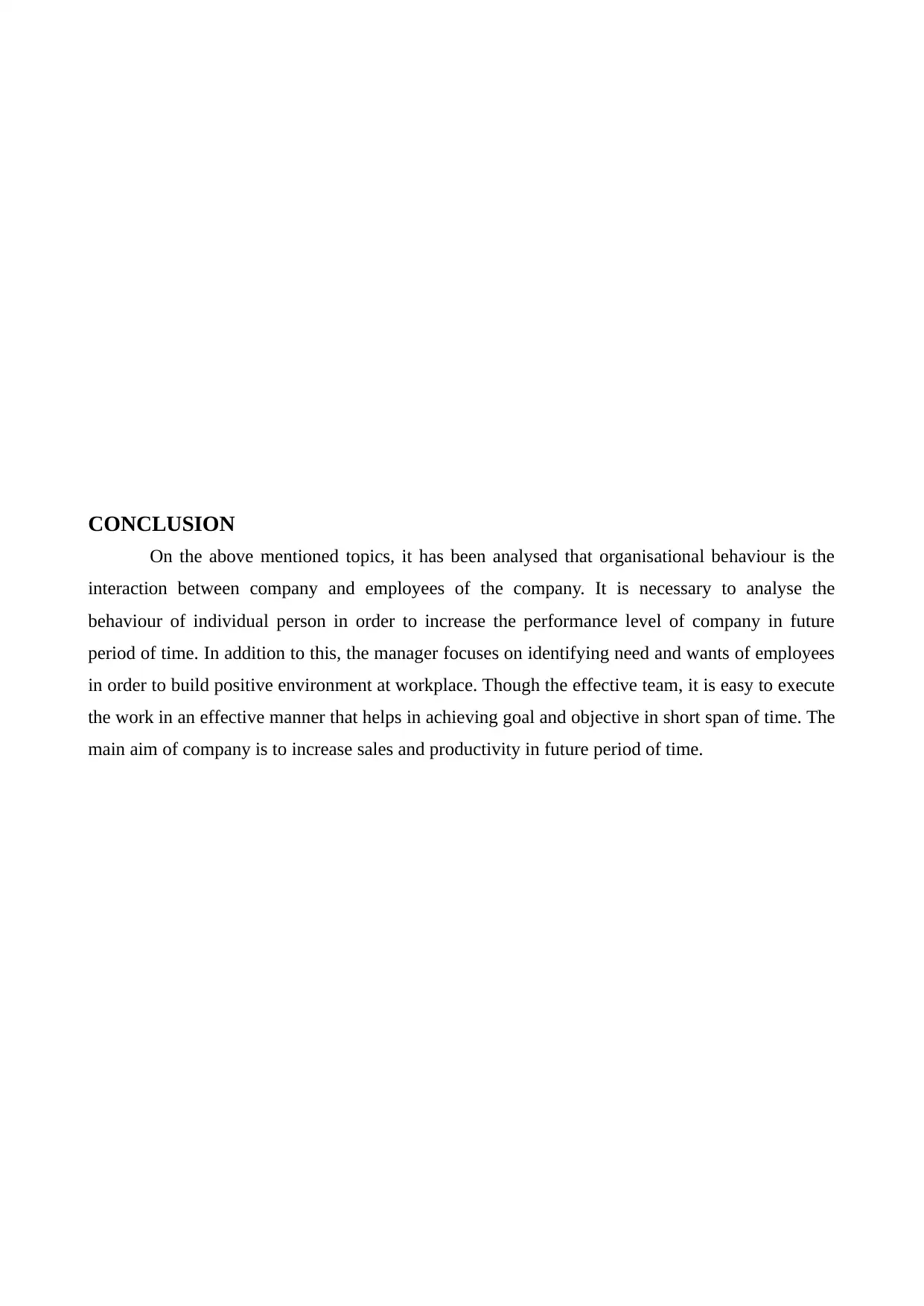
CONCLUSION
On the above mentioned topics, it has been analysed that organisational behaviour is the
interaction between company and employees of the company. It is necessary to analyse the
behaviour of individual person in order to increase the performance level of company in future
period of time. In addition to this, the manager focuses on identifying need and wants of employees
in order to build positive environment at workplace. Though the effective team, it is easy to execute
the work in an effective manner that helps in achieving goal and objective in short span of time. The
main aim of company is to increase sales and productivity in future period of time.
On the above mentioned topics, it has been analysed that organisational behaviour is the
interaction between company and employees of the company. It is necessary to analyse the
behaviour of individual person in order to increase the performance level of company in future
period of time. In addition to this, the manager focuses on identifying need and wants of employees
in order to build positive environment at workplace. Though the effective team, it is easy to execute
the work in an effective manner that helps in achieving goal and objective in short span of time. The
main aim of company is to increase sales and productivity in future period of time.
Paraphrase This Document
Need a fresh take? Get an instant paraphrase of this document with our AI Paraphraser
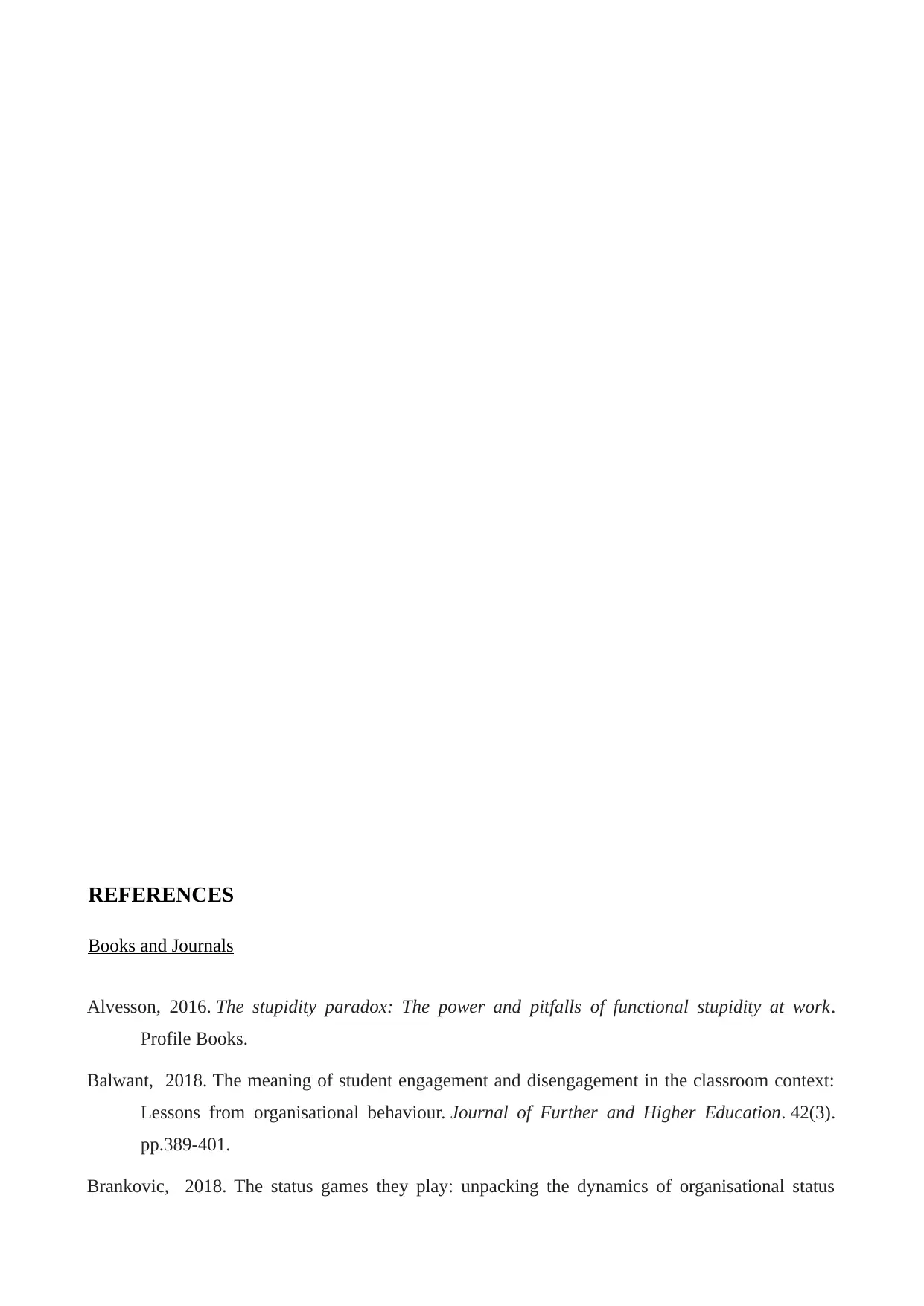
REFERENCES
Books and Journals
Alvesson, 2016. The stupidity paradox: The power and pitfalls of functional stupidity at work.
Profile Books.
Balwant, 2018. The meaning of student engagement and disengagement in the classroom context:
Lessons from organisational behaviour. Journal of Further and Higher Education. 42(3).
pp.389-401.
Brankovic, 2018. The status games they play: unpacking the dynamics of organisational status
Books and Journals
Alvesson, 2016. The stupidity paradox: The power and pitfalls of functional stupidity at work.
Profile Books.
Balwant, 2018. The meaning of student engagement and disengagement in the classroom context:
Lessons from organisational behaviour. Journal of Further and Higher Education. 42(3).
pp.389-401.
Brankovic, 2018. The status games they play: unpacking the dynamics of organisational status
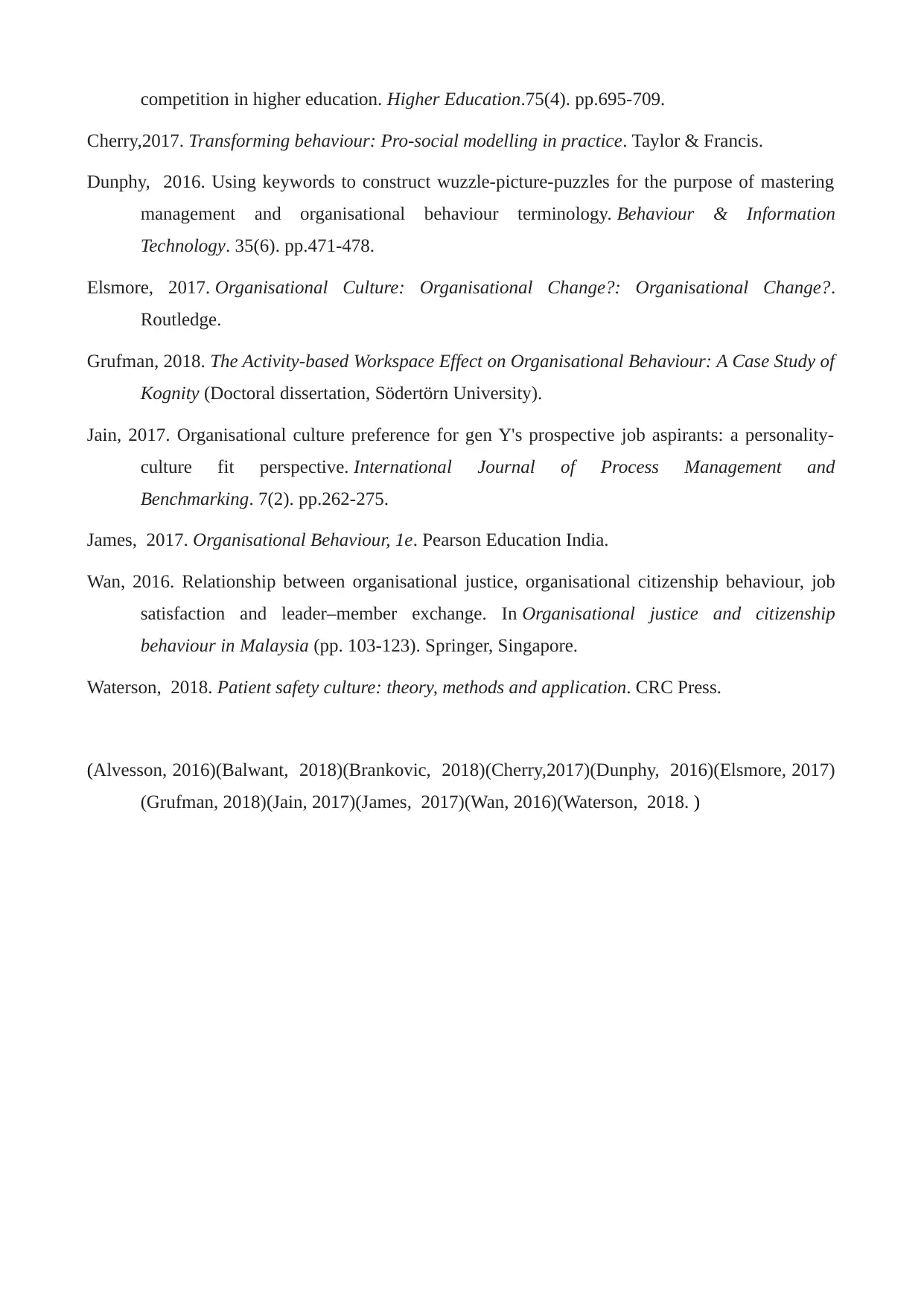
competition in higher education. Higher Education.75(4). pp.695-709.
Cherry,2017. Transforming behaviour: Pro-social modelling in practice. Taylor & Francis.
Dunphy, 2016. Using keywords to construct wuzzle-picture-puzzles for the purpose of mastering
management and organisational behaviour terminology. Behaviour & Information
Technology. 35(6). pp.471-478.
Elsmore, 2017. Organisational Culture: Organisational Change?: Organisational Change?.
Routledge.
Grufman, 2018. The Activity-based Workspace Effect on Organisational Behaviour: A Case Study of
Kognity (Doctoral dissertation, Södertörn University).
Jain, 2017. Organisational culture preference for gen Y's prospective job aspirants: a personality-
culture fit perspective. International Journal of Process Management and
Benchmarking. 7(2). pp.262-275.
James, 2017. Organisational Behaviour, 1e. Pearson Education India.
Wan, 2016. Relationship between organisational justice, organisational citizenship behaviour, job
satisfaction and leader–member exchange. In Organisational justice and citizenship
behaviour in Malaysia (pp. 103-123). Springer, Singapore.
Waterson, 2018. Patient safety culture: theory, methods and application. CRC Press.
(Alvesson, 2016)(Balwant, 2018)(Brankovic, 2018)(Cherry,2017)(Dunphy, 2016)(Elsmore, 2017)
(Grufman, 2018)(Jain, 2017)(James, 2017)(Wan, 2016)(Waterson, 2018. )
Cherry,2017. Transforming behaviour: Pro-social modelling in practice. Taylor & Francis.
Dunphy, 2016. Using keywords to construct wuzzle-picture-puzzles for the purpose of mastering
management and organisational behaviour terminology. Behaviour & Information
Technology. 35(6). pp.471-478.
Elsmore, 2017. Organisational Culture: Organisational Change?: Organisational Change?.
Routledge.
Grufman, 2018. The Activity-based Workspace Effect on Organisational Behaviour: A Case Study of
Kognity (Doctoral dissertation, Södertörn University).
Jain, 2017. Organisational culture preference for gen Y's prospective job aspirants: a personality-
culture fit perspective. International Journal of Process Management and
Benchmarking. 7(2). pp.262-275.
James, 2017. Organisational Behaviour, 1e. Pearson Education India.
Wan, 2016. Relationship between organisational justice, organisational citizenship behaviour, job
satisfaction and leader–member exchange. In Organisational justice and citizenship
behaviour in Malaysia (pp. 103-123). Springer, Singapore.
Waterson, 2018. Patient safety culture: theory, methods and application. CRC Press.
(Alvesson, 2016)(Balwant, 2018)(Brankovic, 2018)(Cherry,2017)(Dunphy, 2016)(Elsmore, 2017)
(Grufman, 2018)(Jain, 2017)(James, 2017)(Wan, 2016)(Waterson, 2018. )
⊘ This is a preview!⊘
Do you want full access?
Subscribe today to unlock all pages.

Trusted by 1+ million students worldwide
1 out of 12
Related Documents
Your All-in-One AI-Powered Toolkit for Academic Success.
+13062052269
info@desklib.com
Available 24*7 on WhatsApp / Email
![[object Object]](/_next/static/media/star-bottom.7253800d.svg)
Unlock your academic potential
Copyright © 2020–2026 A2Z Services. All Rights Reserved. Developed and managed by ZUCOL.





